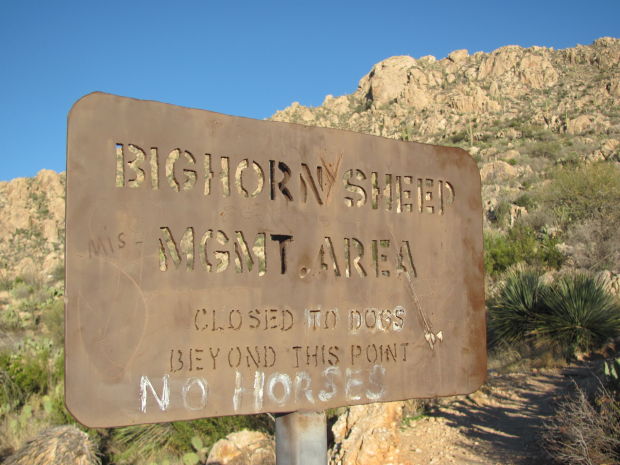State wildlife officials declined Friday to provide current information on a controversial bighorn sheep reintroduction in the Catalina Mountains north of Tucson.
They said news reporters and the public will have to wait for biweekly updates to learn if more bighorn sheep have died in addition to the five deaths previously reported.
Diane Tilton, spokeswoman for the Arizona Game and Fish Department, would neither confirm nor deny that one or more additional sheep have died in the project, in which 31 bighorns were transplanted into the Catalinas in November to rebuilt a herd that had died out.
“All of our information going out to the media will be coming in our biweekly briefing updates,” Tilton said. “The next one will be on the 24th of January.”
Efforts to get updated information from other department officials, including Joe Sacco, a wildlife manager supervisor, brought similar responses. Sacco responded with an email message that said, “Attached is the most recent briefing for the Catalina Bighorn Sheep Reintroduction Project that was released on January 10, 2014. The next briefing will be available on January 24, 2014.”
The Star posed questions to the agency after email messages and a Facebook post by people opposed to the project related as-yet-unverified information about a possible sixth bighorn death.
The post on the Facebook page of the Friends of Wild Animals group said: “The Friends of Wild Animals recently learned that the 6th bighorn sheep is dead in the Catalina Mountains. Thirty-one desert bighorn sheep were released in November 2013 in what will likely be a failed attempt to re-establish a bighorn population in the Catalina Mtns. The 20 percent mortality in two months indicates the remaining 25 sheep won’t be alive at the end of 2014, unless the mortality rate diminishes.”
Members of the group declined to reveal their source of information. That, and the refusal of the Game and Fish Department to clarify the situation, means there is no certainty that an additional sheep has died.
It’s also not known if more mountain lions have been killed in addition to two lions that previously were killed for preying on bighorns.
State Sen. Olivia Cajero Bedford, who attended the Jan. 10 briefing on the project, said Friday that she has repeatedly had difficulty getting up-to-date information on the bighorn reintroduction from wildlife officials.
“It’s not transparent,” Cajero Bedford said of the project. “There’s a secretiveness about it. They should be more forthright.”
She said she plans to request information from a state budget committee about project expenditures.
Meanwhile, a member of a citizens’ advisory committee working with the Game and Fish Department on the project defended the delayed flow of information and maintained that a Star reporter is “sensationalizing” the story.
“All this information is going to come out on a regular basis — every two weeks,” said committee member Randy Serraglio of the Center for Biological Diversity.
“There are lots of wildlife projects that put out regular updates. They don’t do a press release about every little thing that happens.”
Serraglio added, “You’re sensationalizing this story so you can sell papers. You’re obsessed with this lions versus sheep issue.”
Some environmental activists see it differently.
Rich Small, of the Friends of Wild Animals group, said that “this is a controversial project” calling for prompt dissemination of information — especially in a fast-paced “information age.”
“The public interest demands an immediate update on what’s going on and when,” Small said.
“The idea that we have to wait a couple of weeks for information is just crazy.”






